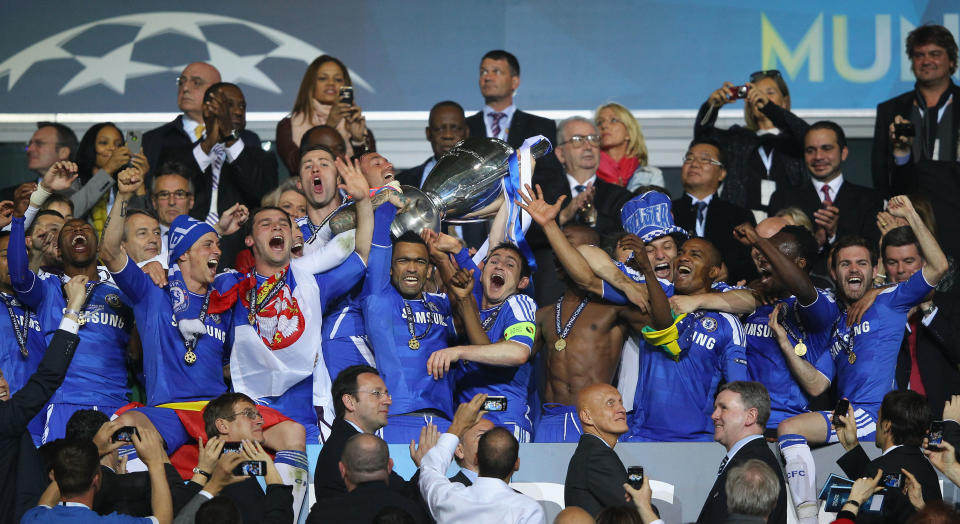Can five Premier League participants end England’s Champions League funk?

Ever since plucky underdog Chelsea stunned all of Europe en route to the 2012 Champions League title, the Premier League has been notably absent from the latter rounds of the world’s premiere club competition. Just two English sides have reached the semifinals. Once there, they combined to score one goal. And only two others have even advanced beyond the Round of 16.
The Premier League, for the most part, has succumbed to the supremacy of four clubs: PSG, Bayern Munich, Barcelona and Real Madrid. The latter three have owned the last five years of the competition. They’ve shared the trophy only among themselves. They have left the rest of Europe, and particularly England, to ponder inferiority.
Which, when you think about it, isn’t at all surprising. Bayern Munich. Barcelona. Real Madrid. Europe’s Big Three.
Yet the questions are prevalent: What are the sources of the Premier League’s Champions League failures? Why have British clubs underperformed?
The answers to those questions vary. The excuses and explanations are wide-ranging. They come from everywhere, from Jose Mourinho on down to inebriated pub-goers.
But the most appropriate answer is a question in itself: Why are the Premier League’s problems so puzzling? Why has so much time been spent trying to solve them? Why is this a column that needs to be written?
The Premier League has “underperformed” rather than just “performed poorly” in the Champions League because, for various reasons, many consider it the best domestic league in the world. It has marketed itself as such, and been popularly lauded as such. It has the most money. And a decade ago, it regularly produced European giants.
In 2007-08 and 2008-09, all eight Premier League teams that entered the Champions League progressed to the quarterfinals. Six of the eight reached the semis. Three of the four finalists hailed from England, and Manchester United claimed one of the two titles. Essentially, only Barcelona stood between the Premier League and European dominance.
But nine years later, a lot stands between the Premier League and European dominance. As we approach the 10-year anniversary of the last all-English final, 2008 and 2009 are largely irrelevant. They proved nothing about the superiority of a given domestic league over another back then, and certainly prove nothing now.
And even if they did – even if the Premier League does deserve the coveted title of Best League in the World nine years later – what does that have to do with a matchup between Manchester City and Real Madrid? Between Chelsea and Barcelona? Between Arsenal and Bayern Munich?
The Premier League probably does deserve that title, but not because its top dogs are better than Germany’s or Spain’s. Arguments in favor of the English top flight hinge on the depth of its top tier, and on its top-to-bottom strength – with an emphasis on bottom.
The Premier League’s towering financial stature means its middle can grossly outspend La Liga’s middle. Its bottom half is far richer than the Bundesliga’s. But Bayern, Barcelona and Madrid, who aren’t so dependent on their league’s TV contracts for revenue, can keep up. So can PSG. And all four have surpassed England’s big six because they’ve matched their vast resources and put those resources to better use. They’ve developed and invested in better players. They’ve put more coherent and more talented products on the pitch.
They therefore should be expected to gallop past England’s frontrunners, and that’s really all the Premier League’s “underperformance” has entailed. Eleven of its 15 knockout-round qualifiers have lost in the Round of 16. Nine of those 11 have fallen to either Bayern, Real, Barca or PSG.
And thus, we get a table like this:

The Premier League’s four Round-of-16 victories, meanwhile, have come against Sevilla, Dynamo Kiev, Olympiacos and Galatasaray. Which sounds about right. England’s elite is a step or three ahead of the Champions League’s middle class. But it’s a step behind continental Europe’s superclubs.
Monaco’s upsets of Manchester City and Arsenal aside, English clubs have won the two-leg ties they should have won. They lost the two-leg ties they should have lost. In some cases, knockout round draws have been unkind. In others, second-place group finishes have been costly. But once games have kicked off, English teams have performed roughly in line with expectations.
The question is whether they’ve closed the gap – whether they’ve improved enough to heighten those expectations. The two Manchester clubs appear to be within striking distance. Pep Guardiola has Champions League experience and an eclectic mix of attacking talent. Jose Mourinho does too. Antonio Conte’s Chelsea, with its defensive solidity, could challenge as well.
But of the five English participants, only City and United have the depth to make a run. Chelsea’s strategic selling has crippled its ability to make bids for both a Premier League and European crown. Tottenham and Liverpool look wholly unprepared.
It is somewhat improbable that not a single English club has won as a definitive underdog in the knockout stages over the past five Champions League campaigns. With five contenders to buck that trend, perhaps 2017-18 will bring an upset or two. Or perhaps the draw will bring lesser opponents.
But at some point, Madrid or Barcelona or Munich or PSG will come calling. And when they do, the gap between Europe’s elite and England’s will likely still be apparent. None of the Premier League’s five flag-bearers have yet done enough to close it.
– – – – – – –
Henry Bushnell covers soccer – the U.S. national teams, the Premier League, and much, much more – for FC Yahoo and Yahoo Sports. Have a tip? Question? Comment? Email him at henrydbushnell@gmail.com or follow him on Twitter @HenryBushnell.



